#prison systems
Text
the reality of what cancel culture has become is a practise that actively and maliciously stunts growth, rehabilitation and reform. and when those who are still engaging in cancelling challenge this, they say that cancel culture isn't real, and that it's just accountability.
accountability now has become a buzzword associated with vindictive behaviour, and it's more likely for people to be more averse to holding themselves "accountable" now, than if they'd been asked it say, ten years ago.
not that accountability has a specific enough definition, practise and moral grounding to work as an idea when it comes to doing or saying things that hurt others. what accountability has become in the age of cancel culture, is removing yourself from support systems, platforms, financial stability and boundaries of your personal life, and if one doesn't take "accountability" willingly, you're forced into it by the cancel brigade. it's punitive, and punitive justice doesn't work.
let's equate cancel culture and accountability with USA and UK justice systems for a moment, hypothetically. these are countries that operate with a punitive justice system, and we only need to look at data to know that it doesn't work. for example, the reoffending rates in the UK within 8 years of imprisonment is 77%, cited here, and in the USA, "within three years of their release, two out of three former prisoners are rearrested and more than 50% are incarcerated again."
both of these countries use prison systems that function on punishment of the offenders, and gratification of the public. it's very similar to the whole notion of throwing tomatoes at those in the stocks — the public gain gratification from watching criminals have their basic rights, freedoms and support systems stripped away. and in these prison systems, offenders are dehumanised, insulted, physically harmed, berated and isolated.
this is painfully similar to cancel culture. those who are cancelled are dehumanised, insulted, isolated, berated, and yes, sometimes even physically harmed. there have been cases of cancel culture leading to murder and suicide, and what? all for the sake of those instigating it to feel a bastardised sense of gratification from what they call justice? this doesn't help people, whether they've actually done a shitty thing or not, whether that thing was severe and violent or some mean words said on the internet. and it doesn't work, because punishment and punitive justice doesn't stop those problems — it exacerbates them. it angers people who are being targeted and often, leads them to want to retaliate. and if they don't retaliate, they lose everything.
now, what does work? let's go back to comparing prison systems to justice and rehabilitation. take a look at norway and the way their prison systems function. in the 90s, norway completely reformed their prison system from punishment to rehabilitation. since that change, recidivism rates have dropped from 60-70% to 20%. and in those prisons, offenders are treated with respect, trusted with freedom, offered therapy and education, and aren't berated. when offenders are given support systems, help, therapy and kindness, they stop offending. they get better.
the same can be said for people who aren't criminals, but for instance, have said or done something that is "cancellable". even abusers, and people who have done incredibly shitty things. when given support, therapy, education, kindness, people will change. people will grow. and those behaviours that are the cause of cancellations, and by proxy, mental health crises, addiction, being at risk of attack and suicide, will decrease.
it's not a complicated issue to solve. it's not fucking difficult, when faced with the question 'how do we stop people from doing shitty things?'
the answer is there. we stop punishing them. we don't strip them of support systems, we don't publicly humiliate them, we don't simulate tragically fascist right wing practises of punitive justice, twisted gratification and policing on smaller scales in our own communities. it isn't logical, it isn't sensible, and it certainly isn't left wing.
i'm sick and fucking tired of seeing people argue that cancel culture is social justice, for a good cause, and left wing. it's none of those things, and it's high time the genuinely politically left reclaim the notion of community and kinship and help our families, friends and acquaintances instead of handing out punitive justice like armchair judges and jurors. chuck that shit in the bin and start being nice to people again.
#monad.txt#sociology#leftism#politics#anti cancel culture#cancel culture#healing#justice#punitive justice#prison systems#rehabilitation#accountability
86 notes
·
View notes
Text

#mainly referencing the usa because of the fucking stupid prison system we’ve got#but i think that criminals should be able to vote too
62K notes
·
View notes
Text

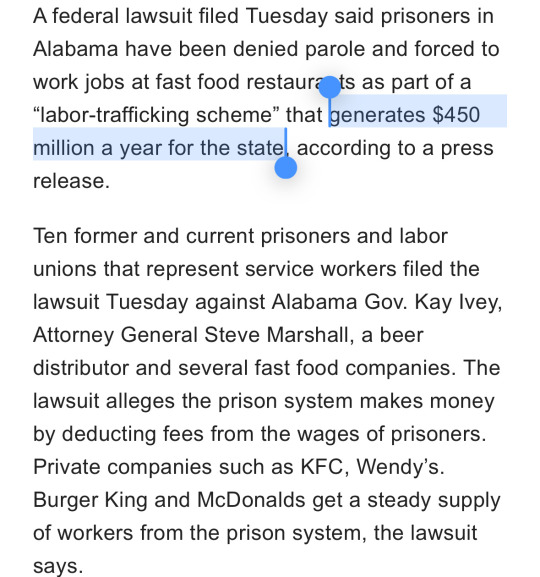
Source
Reminder that 53% of Alabama’s prison population is black people who are incarcerated at 3x the rate as white people (source).
#prisons#abolish prisons#criminal justice#criminal justice system#news#Alabama#current events#workers rights#workers#capitalism#government
2K notes
·
View notes
Text
i think it would be funny if people occasionally arose from the dead. like if that was a real-life one-in-a-million but well-documented Thing That Sometimes Happens, and the entire legal system around death (laws on inheritance & marriage & murder etc) had to include caveats for the unlikely-but-scientifically-possible event that the dead person in question might spontaneously self-resurrect, even years or decades after death. it would raise so many inconvenient and absurd possibilities
#imagine the legal system in that timeline#property laws and inheritance laws and bigamy laws--what happens if your spouse resurrects 10 years after they die?#think how AWKWARD that would be#what happens if you inherit from someone who comes back do you have to give the inheritance back? what if u used it to buy stuff?#does the jetski u bought with the money your grandpa left u 15 years ago in college now belong to grandpa?#or is there a statute of limitations?#if the guy you got convicted of murdering returns from the dead does your conviction get changed from murder to grievous harm?#how is the grievousness of the harm measured? in the number of years the guy spent as a corpse?#what if you spend 20 years in prison and the victim comes back to life and it turns out grievous harm would have landed you only 5ish years#do you get reimbursed for the extra 15 years u spent in prison?#what is the legal process for proving you have come back to life?#what are the minimum legal requirements for establishing a revenant's identity?#does it become regulation to make fingerprint/dental records of every single person who dies just on the off chance one of them comes back?#what happens if it's someone from like 300 years ago?#the world has changed and everyone they know is dead. is there a social services department that can help with that?#there would be a whole branch of counseling services for people who have reanimated or had a loved one reanimate#grief 2.0 counselors
12K notes
·
View notes
Text
"Research on a police diversion program implemented in 2014 shows a striking 91% reduction in in-school arrests over less than 10 years.
Across the United States, arrest rates for young people under age 18 have been declining for decades. However, the proportion of youth arrests associated with school incidents has increased.
According to the U.S. Department of Education, K–12 schools referred nearly 230,000 students to law enforcement during the school year that began in 2017. These referrals and the 54,321 reported school-based arrests that same year were mostly for minor misbehavior like marijuana possession, as opposed to more serious offenses like bringing a gun to school.
School-based arrests are one part of the school-to-prison pipeline, through which students—especially Black and Latine students and those with disabilities—are pushed out of their schools and into the legal system.
Getting caught up in the legal system has been linked to negative health, social, and academic outcomes, as well as increased risk for future arrest.
Given these negative consequences, public agencies in states like Connecticut, New York, and Pennsylvania have looked for ways to arrest fewer young people in schools. Philadelphia, in particular, has pioneered a successful effort to divert youth from the legal system.
Philadelphia Police School Diversion Program
In Philadelphia, police department leaders recognized that the city’s school district was its largest source of referrals for youth arrests. To address this issue, then–Deputy Police Commissioner Kevin Bethel developed and implemented a school-based, pre-arrest diversion initiative in partnership with the school district and the city’s department of human services. The program is called the Philadelphia Police School Diversion Program, and it officially launched in May 2014.
Mayor-elect Cherelle Parker named Bethel as her new police commissioner on Nov. 22, 2023.
Since the diversion program began, when police are called to schools in the city for offenses like marijuana possession or disorderly conduct, they cannot arrest the student involved if that student has no pending court case or history of adjudication. In juvenile court, an adjudication is similar to a conviction in criminal court.
Instead of being arrested, the diverted student remains in school, and school personnel decide how to respond to their behavior. For example, they might speak with the student, schedule a meeting with a parent, or suspend the student.
A social worker from the city also contacts the student’s family to arrange a home visit, where they assess youth and family needs. Then, the social worker makes referrals to no-cost community-based services. The student and their family choose whether to attend.
Our team—the Juvenile Justice Research and Reform Lab at Drexel University—evaluated the effectiveness of the diversion program as independent researchers not affiliated with the police department or school district. We published four research articles describing various ways the diversion program affected students, schools, and costs to the city.
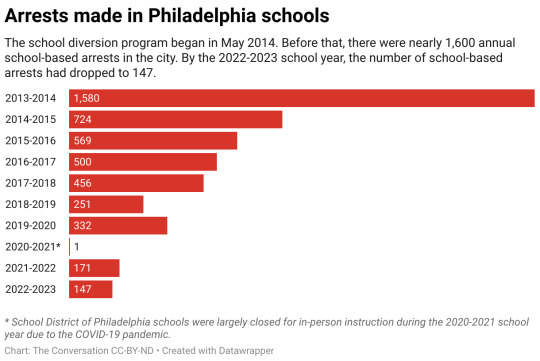
Arrests Dropped
In our evaluation of the diversion program’s first five years, we reported that the annual number of school-based arrests in Philadelphia decreased by 84%: from nearly 1,600 in the school year beginning in 2013 to just 251 arrests in the school year beginning in 2018.
Since then, school district data indicates the annual number of school-based arrests in Philadelphia has continued to decline—dropping to just 147 arrests in the school year that began in 2022. That’s a 91% reduction from the year before the program started.
We also investigated the number of serious behavioral incidents recorded in the school district in the program’s first five years. Those fell as well, suggesting that the diversion program effectively reduced school-based arrests without compromising school safety.
Additionally, data showed that city social workers successfully contacted the families of 74% of students diverted through the program during its first five years. Nearly 90% of these families accepted at least one referral to community-based programming, which includes services like academic support, job skill development, and behavioral health counseling...
Long-Term Outcomes
To evaluate a longer follow-up period, we compared the 427 students diverted in the program’s first year to the group of 531 students arrested before the program began. Results showed arrested students were significantly more likely to be arrested again in the following five years...
Finally, a cost-benefit analysis revealed that the program saves taxpayers millions of dollars.
Based on its success in Philadelphia, several other cities and counties across Pennsylvania have begun replicating the Police School Diversion Program. These efforts could further contribute to a nationwide movement to safely keep kids in their communities and out of the legal system."
-via Yes! Magazine, December 5, 2023
#philedelphia#pennsylvania#united states#us politics#school#high school#school to prison pipeline#prison system#arrests#education#students#schools#good news#hope#rare case of police not completely sucking#police#policing#law enforcement
1K notes
·
View notes
Note
May I present the best headline I've seen today:

Look, the Fulton County people have already said they plan to give him the full works: fingerprinting, mugshot, perp walk, releasing height/weight, etc, all the usual criminal treatment that he's managed to avoid so far. So yeah, he's gonna fucking HATE it, and if I don't see the mugshot everywhere on everything and made into all the memes you can think of, the internet will have failed me.
#textsfromgravityfallsblog#ask#politics for ts#the giant orange monster#i don't approve of the carceral system etc etc but also if there is anyone who deserves the worst the american prison system has to offer#it's the fucking orange fuhrer#so yeah
1K notes
·
View notes
Text
Spanking is to parenting what prisons are to criminal justice. Allow me to elaborate:
What does spanking do? “It teaches kids to behave!” Actually, no. It teaches kids to fear their caregiver(s). But say we go with that line. How does spanking teach kids to behave? “It shows them the consequences of bad actions!” Actually, no. It shows kids that when the caregiver is displeased, the kid gets hurt. In the mind of the child, the sequence of events is not [misbehave:consequence]. It is [caregiver unhappy:pain]. And maybe you’ll say “But my kid stopped mouthing off after I started spanking them for it”. Okay, sure. Maybe they stopped responding when you argue, but only because the learned to fear what their response would bring. They’re not holding their tongue because they realized it’s disrespectful or rude or whatever else you believe it is. They’re holding their tongue because they know it won’t do any good and will only make the situation worse for them. I can guarantee they are still thinking all those rebellious naughty talk-backy thoughts. They just aren’t saying them out loud. Spanking did not teach your child to behave, it taught them to walk on eggshells.
Similarly, prisons do absolutely nothing to enforce laws. Prisons do nothing to fix the real crimes that do get committed. A shooter or rapist or embezzler being incarcerated does not bring their victim back to life, un-traumatize them, or make reparations for any damages. Additionally, it makes life a living hell for the innocent people who end up in jail (OF WHICH THERE ARE A HELL OF A LOT). And maybe you might say that the point of prison is to encourage good behavior, because no one wants to go to jail. I would ask, then, why there are so many prisons, of which so many are full or overcrowded. Clearly, the threat of incarceration is not keeping people out of jail. Additionally, much like a child who was spanked being afraid to do normal things in their own home for fear of displeasing their caregiver, regular non-criminal people are afraid of prison, even though they have done nothing wrong. They know they could be incarcerated because of falsified evidence, biased testimonies, unfair trial, or simply bigotry. Especially people of color. Even though they haven’t done anything wrong, they are scared of what could happen to them if the person in power (police) was unhappy with them.
Negative consequences unrelated to the actual incident do not discourage “bad behavior”. Just like a child who is spanked will simply learn to be sneakier, a thief who goes to jail will simply cover their tracks better next time.
Stop spanking your kids, and abolish prisons. Have a nice day.
#gentle parenting#criminal justice system#prison abolition#police brutality#parenting#corporal punishment#prison system#child abuse#don’t hit your fucking kids
670 notes
·
View notes
Text
as you discuss donald trump being found guilty on all 34 counts, please keep the following in mind, especially if you consider yourself a prison abolitionist or hold any sort of critical opinions towards the criminal justice system:
being found guilty of a felony does not automatically mean you are a bad person, are incapable of doing good things, or that you should have your rights taken away. felons are people who should be treated with respect

[id: a variation on the "insult deflection" meme. the shooter labeled "you" is shooting a laser labeled "haha you're a felon" at a person labeled trump, who uses a mirror to deflect the laser, which hits a third person labeled "people who have been victimized by the criminal "justice" system and have had their rights taken away because of a felony charge" /end id]
#trump#donald trump#anarchist#leftist#my anarchism#leftism#prison abolition#acab1312#legalize cannabis#systemic racism#civil rights#discrimination#trump guilty
124 notes
·
View notes
Text

THE FINAL PERFORMANCE
#i have spent fuckin MONTHS on this iaehfgsfgjs#outer wilds#ow#echoes of the eye#outer wilds fanart#the hatchling#solanum#the prisoner#solanum outer wilds#the prisoner outer wilds#kaepora outer wilds#eye of the universe#outer wilds solar system#outer wilds spoilers#echoes of the eye spoilers#ow spoilers#eote spoilers#art#my art#artists on tumblr
292 notes
·
View notes
Text
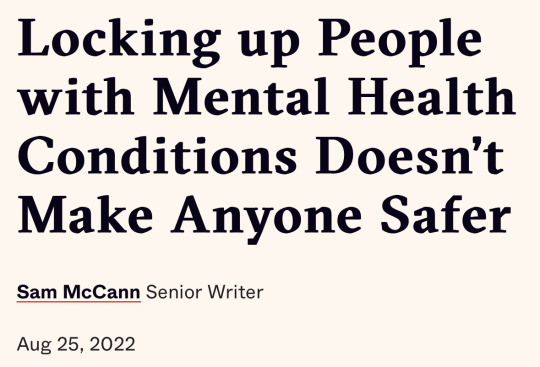
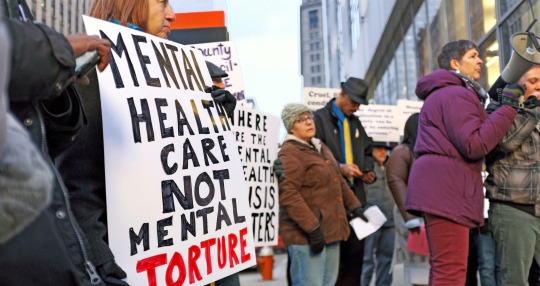
Source
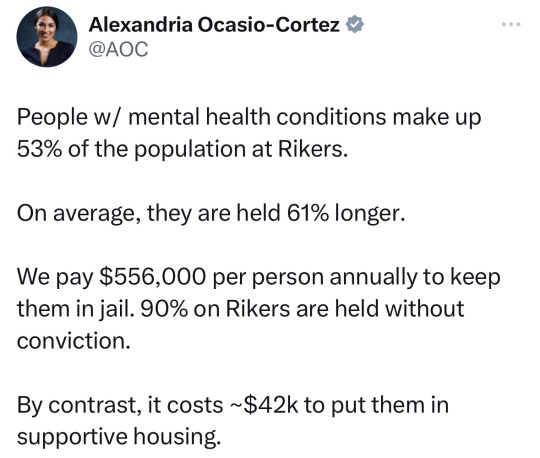
#mental health#criminal justice system#abolish prisons#politics#us politics#aoc#government#the left#twitter post#progressive
2K notes
·
View notes
Text
when the host is feeling awful so another alter switches out but they feel awful too so you’re all just switching around trying to feel better and you’re just sitting there like

2K notes
·
View notes
Text
"Expanding freedom and opportunity to millions
Over a decade ago, researchers, policymakers, journalists, and individuals and family members harmed by prisons and jails helped define American mass incarceration as one of the fundamental policy challenges of our time. In the years since, policymakers and voters in red, blue, and purple jurisdictions have advanced criminal justice reforms that safely reduced prison and jail populations, expanding freedom and opportunities to tens of millions of Americans.
After nearly forty years of uninterrupted prison population growth, our collective awareness of the costs of mass incarceration has fundamentally shifted–and our sustained efforts to turn the tide have yielded meaningful results.

Since its peak in 2009, the number of people in prison has declined by 24 percent (see figure 1). The total number of people incarcerated has dropped 21 percent since the 2008 peak of almost 2.4 million people, representing over 500,000 fewer people behind bars in 2022. Absent reforms, more than 40 million more people would have been admitted to prison and jail over this period. The number of people on probation and parole supervision has also dropped 27 percent since its peak in 2007, allowing many more people to live their lives free from onerous conditions that impede thriving and, too often, channel them back into incarceration for simple rule violations.1
"Absent reforms, more than 40 million more people would have been admitted to prison and jail over this period. [2008 to 2022]"
Make no mistake: mass incarceration and the racial and economic disparities it drives continue to shape America for the worse. The U.S. locks up more people per capita and imposes longer sentences than most other countries. Nearly 1-in-2 adults in the U.S. have an immediate family member that has been incarcerated, with lifelong, often multigenerational, consequences for family members’ health and financial stability. Yet the past decade of successful reforms demonstrate that we can and must continue to reduce incarceration. These expansions of freedom and justice–and the millions of people they have impacted–help define what is at stake as public safety has reemerged as a dominant theme in American public and political conversation.
...We have a robust body of research built over decades showing that jail stays and long prison sentences do not reduce crime rates. And fortunately, we have an extensive and expanding body of research on what does work to reduce crime and keep communities safe. The evidence is clear: our focus must be on continuing and accelerating reductions in incarceration.
Black imprisonment rate drops by nearly half
People directly impacted by incarceration and other leaders in the criminal justice reform movement have persistently called out how the unequal application of policies such as bail, sentencing, and parole (among others) drive massive racial disparities in incarceration. The concerted effort to reduce our prison population has had the most impact on the group that paid the greatest price during the rise of mass incarceration: Black people, and particularly Black men.

The Black imprisonment rate has declined by nearly 50 percent since the country’s peak imprisonment rate in 2008 (see figure 2). And between 1999 and 2019, the Black male incarceration rate dropped by 44 percent, and notable declines in Black male incarceration rates were seen in all 50 states. For Black men, the lifetime risk of incarceration declined by nearly half from 1999 to 2019—from 1 in 3 Black men imprisoned in their lifetime to 1 in 5.
While still unacceptably high, this reduction in incarceration rates means that Black men are now more likely to graduate college than go to prison, a flip from a decade ago. This change will help disrupt the cycle of incarceration and poverty for generations to come.
Expanding safety and justice together
The past decade-plus of incarceration declines were accompanied by an increase in public safety. From 2009-2022, 45 states saw reductions in crime rates, while imprisoning fewer people, with crime falling faster in states that reduced imprisonment than in states that increased it.
This is in keeping with the extensive body of research showing that incarceration is among the least effective and most expensive means to advance safety. Our extremely long sentences don’t deter or prevent crime. In fact, incarcerating people can increase the likelihood people will return to jail or prison in the future. Public safety and a more fair and just criminal system are not in conflict.
Strong and widespread support for reform
We have also seen dramatic progress on the public opinion front, with a clear understanding from voters that the criminal justice system needs more reform, not less. Recent polling shows that by a nearly 2 to 1 margin respondents prefer addressing social and economic problems over strengthening law enforcement to reduce crime. [In simpler terms: people are twice as likely to prefer non-law-enforcement solutions to crimes.]
Nearly nine-in-ten Black adults say policing, the judicial process, and the prison system need major changes for Black people to be treated fairly. Seventy percent of all voters (see figure 3) and 80 percent of Black voters believe it’s important to reduce the number of people in jail and prison. Eighty percent of all voters, including nearly three-fourths of Republican voters, support criminal justice reforms.

This is not only a blue state phenomenon. Recent polling in Mississippi indicates strong support across the political spectrum for bold policies that reduce incarceration. For example, according to polling from last month, 72 percent of Mississippians, including majorities from both parties, believe it is important to reduce the number of people in prison (see figure 4). Perhaps most tellingly, across the country victims of crime also support further reforms to our criminal justice system over solutions that rely on jail stays and harsh prison sentences...
We are at an inflection point: we can continue to rely on the failed mass incarceration tactics of the past, or chart a new path that takes safety seriously by continuing to reform our broken criminal justice system and strengthening families and communities."
-via FWD.us, May 15, 2024
#REFORMS HAVE ALREADY SAVED OVER 40 MILLION PEOPLE FROM ENTERING JAILS AND PRISONS#THAT ALONE IS A MASSIVE MASSIVE ACCOMPLISHMENT#never doubt that we CAN make a difference#no matter how long it takes#we are going to build a better and freer world#whether those in power want us to or not#mass incarceration#prison#prison system#racism#united states#us politics#systemic racism#incarcerated people#incarceration#criminal justice#criminal justice reform#crime rate#prison industrial complex#good news#hope
308 notes
·
View notes
Text

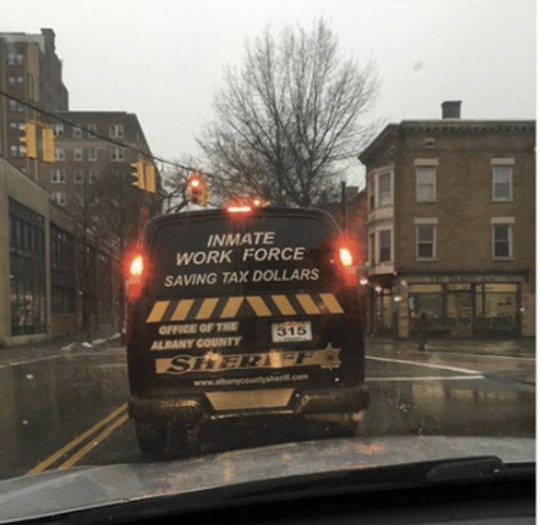


#abolish the prison industrial complex#us jails#us jail system#ftp#defund the police#defundthepolice#police brutality#blm#capitalism kills#capitalist system#abolishtheprisonindustrialcomplex#black lives matter#no justice no peace#albany#aclu#13th amendment#free labor
3K notes
·
View notes
Photo
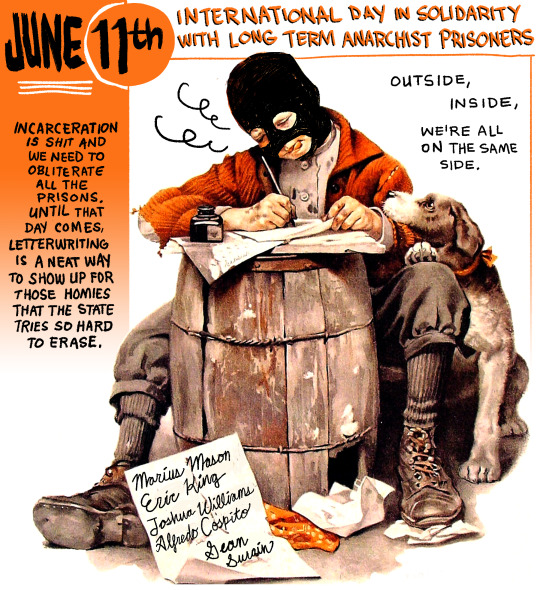
June 11 is coming! go write a letter!
Fuck prisons fuck the laws that put us in them and fuck the cops that uphold those laws.
Hella dm me if ur looking for some folks to support. Or you can check out mongoose distro, abcportland, thefinalstrawradio they're always doing a good job of looking out for the locked up homies.
Also a.b.o.comix is really cool! They get comics from queer prisoners and sellem for commissary bucks.
And lgbtbookstoprisoners is cool! I sent them a buncha Godshaper comics! You should give them books too!
530 notes
·
View notes
Text
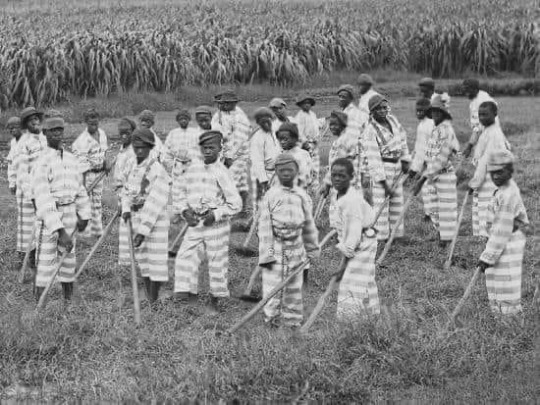
IF YOU DIDN'T KNOW THIS YESTERDAY THEN TODAY WOULD BE A GOOD DAY TO LEARN THIS.... "All stories don't have a happy ending"
In 1866, one year after the 13 Amendment was ratified (the amendment that ended slavery), Alabama, Texas, Louisiana, Arkansas, Georgia, Mississippi, Florida, Tennessee, and South Carolina began to lease out convicts for labor (peonage). This made the business of arresting Blacks very lucrative, which is why hundreds of White men were hired by these states as police officers. Their primary responsibility was to search out and arrest Blacks who were in violation of Black Codes. Once arrested, these men, women and children would be leased to plantations where they would harvest cotton, tobacco, sugar cane. Or they would be leased to work at coal mines, or railroad companies. The owners of these businesses would pay the state for every prisoner who worked for them; prison labor.
It is believed that after the passing of the 13th Amendment, more than 800,000 Blacks were part of the system of peonage, or re-enslavement through the prison system. Peonage didn’t end until after World War II began, around 1940.
This is how it happened.
The 13th Amendment declared that "Neither slavery nor involuntary servitude, except as a punishment for crime whereof the party shall have been duly convicted, shall exist within the United States, or any place subject to their jurisdiction." (Ratified in 1865)
Did you catch that? It says, “neither slavery nor involuntary servitude could occur except as a punishment for a crime". Lawmakers used this phrase to make petty offenses crimes. When Blacks were found guilty of committing these crimes, they were imprisoned and then leased out to the same businesses that lost slaves after the passing of the 13th Amendment. This system of convict labor is called peonage.
The majority of White Southern farmers and business owners hated the 13th Amendment because it took away slave labor. As a way to appease them, the federal government turned a blind eye when southern states used this clause in the 13th Amendment to establish laws called Black Codes. Here are some examples of Black Codes:
In Louisiana, it was illegal for a Black man to preach to Black congregations without special permission in writing from the president of the police. If caught, he could be arrested and fined. If he could not pay the fines, which were unbelievably high, he would be forced to work for an individual, or go to jail or prison where he would work until his debt was paid off.
If a Black person did not have a job, he or she could be arrested and imprisoned on the charge of vagrancy or loitering.
This next Black Code will make you cringe. In South Carolina, if the parent of a Black child was considered vagrant, the judicial system allowed the police and/or other government agencies to “apprentice” the child to an "employer". Males could be held until the age of 21, and females could be held until they were 18. Their owner had the legal right to inflict punishment on the child for disobedience, and to recapture them if they ran away.
This (peonage) is an example of systemic racism - Racism established and perpetuated by government systems. Slavery was made legal by the U.S. Government. Segregation, Black Codes, Jim Crow and peonage were all made legal by the government, and upheld by the judicial system. These acts of racism were built into the system, which is where the term “Systemic Racism” is derived.
This is the part of "Black History" that most of us were never told about.
401 notes
·
View notes
Text

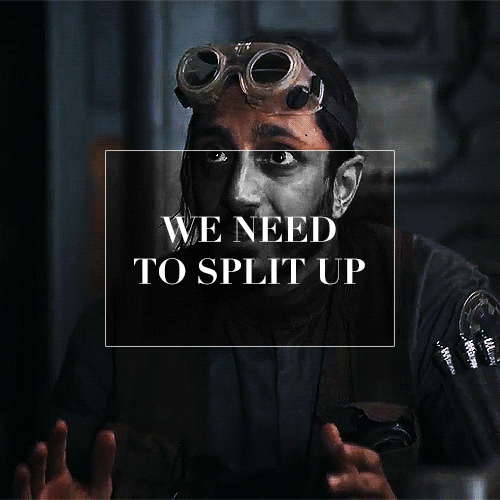
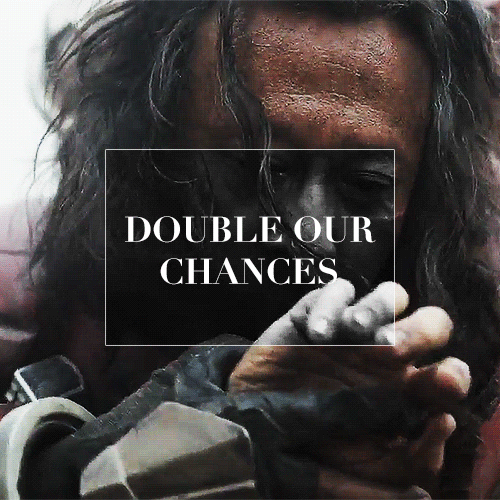
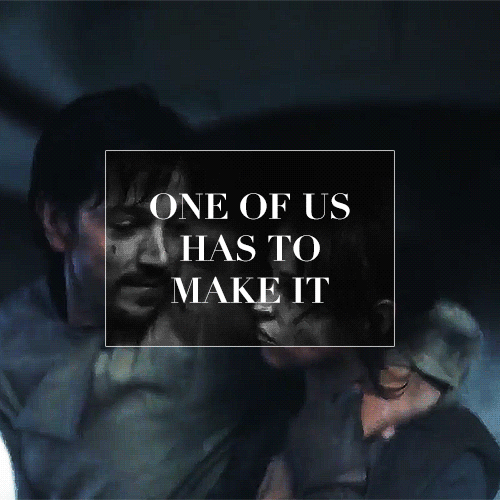

How many do you think made it? How many of us made it out alive?
Not enough.
Andor 1x11, "Daughter of Ferrix"
#starwarsedit#andoredit#rogueoneedit#andor spoilers#star wars#andor#rogue one#swedit#filmedit#cassian andor#ruescott melshi#jyn erso#baze malbus#bodhi rook#chirrut imwe#i could not stop thinking about this...that their escape didn't stop the imperial prison system but rogue one stopped the death star#one of us has to make it...and when melshi didn't cassian did#this is either going to make sense or it's not but i worked half of the day on it 🥺#mine#mine: star wars
2K notes
·
View notes